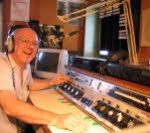- Home
- News
- Articles
- Audio
- Audio Codecs
- Audio Processing
- Broadcast Consoles
- Microphones
- Streaming
- Audio Theory & Practice
- Transmitter Site
- Antennas
- Ground Systems
- Monitoring
- Site Operations
- Towers
- Transmitters
- Business
- Contract Engineering
- Management & Operations
- Trade Show Reports
- Observing the Broadcast Industry
- FCC Matters
- Latest EAS News
- EAS Articles
- Answering EAS Questions
- FCC Enforcement Watch
- FCC Rules & Regulations
- Station Inspections
- Pure Tech
- How Stuff Works
- Maintenance Shift
- Off Duty
- Solutions & Tech Tips
- Test Gear & Tools
- Profiles
- Operations
- People and Obits
- Broadcast History
- Broadcast Station Histories
- Company Profiles
- Checking it Out
- Design & Construction
- Management
- Op Ed and Letters
- Out In The Field
- Studio Issues
- IT Administration
- IT
- Software Solutions
- In the Trenches
- Engineering Follies
- Richard Haskey's: The Worst I've Ever Seen!
- War Stories
- Silly Business
- When the FCC Calls
- What's Wrong with This Picture?
- Manufacturers & Vendors
- Services
- Support
- Resources
- Buy/Sell
- Site Search
- Contact
BDR Picture Page
Some pictures of interest. (Do you have a good shot? Please share it!)
(The license plate Page is now located here.) – (The Mug Shot Page is now located here.)
A Direct Hit!
Even the largest towers can receive quite a shock from lightning. This is from the Sutro tower in San Francisco, after a strike on 1/10/23. No damage was sustained from the lightning, although the wind did cause some damage to the elevator. A worker was actually on the tower at the time … but he is fine!
Courtesy: Raul Velez and Sutro Tower, Inc.
Keeping Time – The Old Way!
Larry Tighe at WRNJ shares some pictures from his station showing the original Western Union clocks. While not connected to WU these days, the clocks are reset via a local power supply and GPS clock. And the station has plans to bring the ‘Top of the Hour” tone back … even selling it to advertisers.

Running At the Right Speed
Vinyl is making a comeback. There is interest in turntables of all kinds, from inexpensive to high-end. But, taking a look at this one on a shelf in the UK, you might need to think twice as to whether you would trust it to be a faithful reproducer.

Bringing a Beacon Down to Ground
It was not so long ago that someone took an ITC cart machine and made it into a curiosity desk lamp.
Recently, when a local tower changed the beacon to LEDs, Doug Groenhoff managed to get the previous beacon and converted it to a nice piece of yard art.
Doug explains: “I took the lamp sockets out and replaced [them] with standard flange mount sockets in the top and bottom. I put two regular household 60W equivalent lamps in it. (consumes 9W each). I moved it to my screened in porch for now. Those are a lot bigger than they look from the ground and it probably weighs 40-50 pounds or so. [I] haven’t lit it up since. Don’t want the neighbors to think I’m running a whorehouse.”

Signs to Discourage Visitors
Danger! Keep out! is not always enough to get the attention of some who would enter a transmitter site. Here is a sign that Jack Davis found that kind of takes it to the next level!

Unwanted Residents
Sometimes, despite all the precautions we can take, our transmitter sites or studios can become home to what are best regarded as unwanted residents, pests, or worse. If you have been around a while, you probably have heard stories of engineers finding things like snakes or mice that gave their life to knock a transmitter off the air. More dangerous are the ones still living.
Among those that create special annoyances are the wasp and hornets’ nests. We showed how one was a fairly effective “Keep Out!” sign.

Here is another, shared by Steve Young from
KHBS-DTV, Rogers, AR.

Dave Kline shares this one, from his station in Omaha. After removing a coax that went through the wall, and inserting some styrofoam, a racoon decided to build a nest, instead. It is not really easy to see, as Dave did not desire to hang around, but seeing the racoon’s eyes was a bit jarring!
Radio Tech A Part of the Community
Radio stations often do Public Service Announcements, to publicize local events and social groups – even sponsoring some of all of an event. On the other hand, it is not too common for an engineer to do. But during October, Santa Paula CA engineer Richard Rudman has sponsored a wheelbarrow in the local Rotary Club Pumpkin Patch event. His sign was especially timely, given the PG&E power outages this month!


We are still looking for a picture of Richard pushing the wheelbarrow!
Don’t You Wish?
If you have ever been given a new studio site to build, without anyone thinking about the need to STL links, you have had one of those “bad” days. Since many of them have only the slightest clue as to where the transmitter is, much less how it all works, the only solution may require two or three hops of RF, plus another link.
Occasionally you work hard and find a solution: locate a nice site with a clean STL shot … and then foliage grows up in the aperture – even a new building! Now what?
Some have given up and just run an Internet STL, but others fight for other solutions – a different studio site, a link via another tower in the cluster, etc. Others go to daydreaming how to solve the problem. Don’t you wish? Sometimes?

Showing Your Colors
We have added more broadcast-oriented plates? Probably you have one – or have seen one recently. As the line below says, “please share.” NOTE: We got a pile of new plates so please go here and enjoy!!!



When the Wind is Really Strong
This picture comes from the SW, where a wind storm apparently came over the parapet and sheared off the pole holding a DB224 antenna. You can see the bottom element still on the pole, and the rest laying on the roof. The curious part is that the shear area does not look bent – just sheared off. Must have been some wind!
Staying Alert as Flu Season Runs
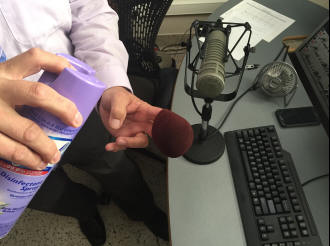 Brian Brashier of KCNP, Chickasaw Community Radio in Ada, OK, shares this picture to remind us that Flu Season continues, and keeping everyone safe and healthy takes proactive efforts.
Brian Brashier of KCNP, Chickasaw Community Radio in Ada, OK, shares this picture to remind us that Flu Season continues, and keeping everyone safe and healthy takes proactive efforts.
While you should definitely be sure (by testing and checking) that you are using a non-destructive method, knocking down germs is a smart move.
Some more prophylactic ideas are located here.
Radio Station Up A Tree
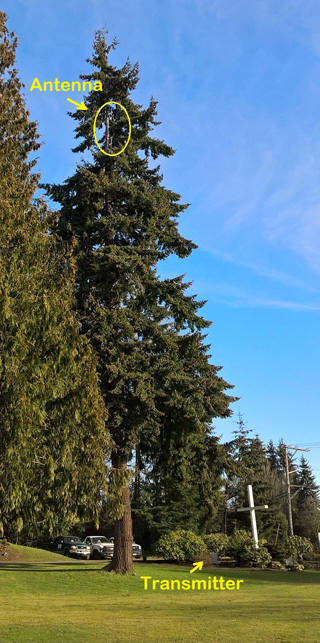 Perhaps it was a zoning issue, perhaps it was trying to avoid the cost of a traditional tower, perhaps it was another reason, but this picture, shared by Clay Freinwald, is of an LPFM station in the Seattle market.
Perhaps it was a zoning issue, perhaps it was trying to avoid the cost of a traditional tower, perhaps it was another reason, but this picture, shared by Clay Freinwald, is of an LPFM station in the Seattle market.
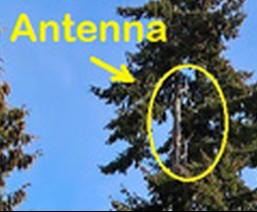 In any event, we are looking at a 2-Bay LPFM antenna hung high, about 100 feet up, in a tree. The antenna itself is visible, although you do have to look for it.
In any event, we are looking at a 2-Bay LPFM antenna hung high, about 100 feet up, in a tree. The antenna itself is visible, although you do have to look for it.
At the base, the antenna is fed by a transmitter at a church.
Putting a Cord to Good Use?
There is hardly a single broadcast shop that does not have a pile of AC cords under the bench. Over time, the pile of cords grows, waiting for some reason to be used. And, here it is, seen by Dave Dunsmoor on a windy night in the upper mid-West:
Curious PC Boards
It is tempting for any engineer to put a little “Easter Egg” on his PC boards. Sometimes it is his initials, sometimes a logo. Here is one that went the extra mile. If you have ever been to England, this PCB will look familiar:
Yes, it is a map of the London Underground! Even neater – it is a working circuit of a radio receiver.
There is an article about it and a high resolution shots here.
Do you have – or know of – and interesting PC Boards and their contents? Please share!
Hurricane Matthew Leaves Mark
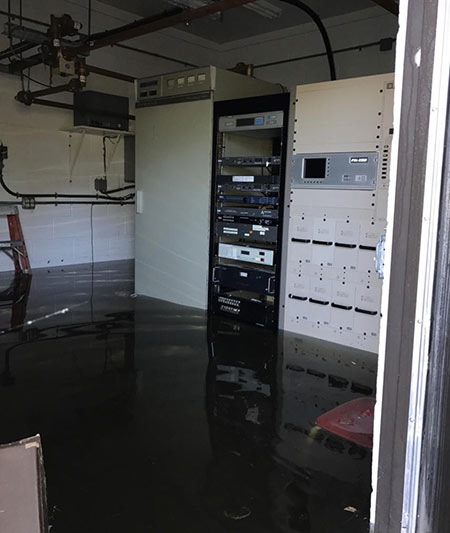 Early October 2016 featured Hurricane Matthew – a strong, slow moving hurricane – that wrecked havoc from Florida to North Carolina and more as it hugged the East Coast, eventually coming ashore, but mostly flooding huge areas, killing electrical grids, and stimulating a lot of evacuations. At least 18 stations were knocked off the air during the storm.
Early October 2016 featured Hurricane Matthew – a strong, slow moving hurricane – that wrecked havoc from Florida to North Carolina and more as it hugged the East Coast, eventually coming ashore, but mostly flooding huge areas, killing electrical grids, and stimulating a lot of evacuations. At least 18 stations were knocked off the air during the storm.
Broadcasters felt it too, as evidenced by this picture of WZKT in Goldsboro, NC.
Allen Sherrill reports two of his three sites in Eastern North Carolina were flooded, with this station likely to dark for a while.
How did things go at your facility?
Engineer Inside

 After all, they do say imitation is the sincerest form of flattery.
After all, they do say imitation is the sincerest form of flattery.
With that in mind, we have to give a lot of credit to John Antonuk, Broadcast Transmission Engineer for iHeart Radio in Fairbanks, AK.
Taking a cue from an earlier BDR logo, which featured your Editor inside a Continental 317 transmitter at KOMO on Vashon Island, Antonuk promptly secured a spot inside KOMO’s standby RCA BTA-50F transmitter.
Of course, one of the little secrets that younger engineers may not know is that the transmitters of the 40s and 50s had plenty of room to walk around inside … although probably not while the HV was on!
Broadcast Pets
 They say that for some reason a pet often reflects the personality – or even look – of their owner. Or visa versa.
They say that for some reason a pet often reflects the personality – or even look – of their owner. Or visa versa.
At the least, some broadcast pets sport names that keep the theme.
As an example, take a careful look at Yagi.
… that is, Yagi Freinwald.
Got one to share? Please do.
CAUTION!
Clay Freinwald tells us “I’m used to contractors posting some caution signs that are required by regulators. In this case, the contractor did not just post a sign – He erected a banner to cover all the bases! Frankly I found this moderately funny.
A Hot Time At The RF Output
(May, 2016) Sometimes things happen inside the transmitter or the RF plumbing that can go unseen for a while, and then – oh boy! the alarms go off. Paul Easter was kind enough to share the results after apparently some “crud built up on the teflon insulator until it started to arc.” This might be a reminder to look “just a bit further” when cleaning a transmitter and/or using an IR Thermometer to check the entire RF chain.

Studio Techniques of the Now Distant Past
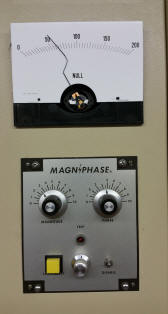 (January 2016) For an interesting look at what radio was like in its first four decades, get one of the textbooks used in schools and colleges to teach young folks the business. It is hard to forget lines from those late 1960s textbooks noting that, in control rooms, “Two tables equipped with 33 1/3 and 78 r.p.m. speed settings are necessary. A 45 r.p.m. setting can also be useful at times.” (italics are mine.)
(January 2016) For an interesting look at what radio was like in its first four decades, get one of the textbooks used in schools and colleges to teach young folks the business. It is hard to forget lines from those late 1960s textbooks noting that, in control rooms, “Two tables equipped with 33 1/3 and 78 r.p.m. speed settings are necessary. A 45 r.p.m. setting can also be useful at times.” (italics are mine.)
Do you have a favorite quote from your school broadcast textbook? Mine, another one regarding studio operation I will never forget, is: “If the needle is slammed abruptly to the top of the dial, the action is called bending the needle.” (emphasis from original text.)
I can only say that when Burt Weiner shared this picture, memories flooded back, and I almost lost the drink in my hand.
(Yes, this is not an audiometer. But the concept works, right? Sometimes, to tell a story, you need to bend things a bit!)
The 2016 Midwest Floods
(December 30, 2015) When bad weather hits, it is often a challenge to get to the studio, much less the transmitter site. December rains especially hit the area around St. Louis, MO. Gary Glaenzer shows the effects of too much water faced by local responders.
To give you a small view of what was going on, Gary sent these pictures of a site on I-44 and MO-141, about a half-mile from the Meramec River. What is a bit frightening is how fast flooding can affect lower lying areas. The first two pictures are from the same site, showing what happened over one night with 6 to 12 inches of rain falling!



The Toy Store Meets Broadcasting
(November 16, 2015) It is always interesting when someone shares a great picture (or pictures) with us. Some, as you can see, come from disasters, others from interesting sights and/or signs on the street, still others just interesting. This picture came from Jim Weinberg of North Beach Media in southern Florida. He has been collecting toys with a broadcast – especially TV – theme for 40 years.








Perhaps, if you would like a better look, here is the original picture in full resolution. If you have some similar toys or promotional items – radio or TV – please share them here. And, if you’d like to chat with Jim about his collection, send him an email!
KOKC Meets the Tornado
(March 26, 2015) It was only a short time ago that the worst thing going was snow, so it was a bit odd to hear about tornados. Sure enough, Moore, OK got hit again. There are a lot of power line flashes. And a death.
Another tornado touched down in the Tulsa area. Another death. And a third touch down was also reported. Not a good night in OK.
KOKC in Moore, OK, got hammered by the tornado. At first, it looked like Tornado 2.5, KOKC 0.5. Chief Engineer Mike Fields noted: “It is so sad to see those Blaw Knox towers on the ground. Nearly 70 years they threw their finger up mother nature and yesterday she won.”



KOKC did get back up – in less than 24 hours. Station Engineer Fields and DOE Randy Mullinax managed to use the remnants of the last partial tower and got back on the air. But they reported the tower was unstable, so the plan is to install a temporary tower on base 1, and then rebiuld all three towers, with a new system design.
We certainly hope KOKC gets back to full power on all three towers quickly.
April 10 – Earlier this week, KOKC took down the stub, because they needed the insualtor for the temporary 190-foot tower (200 Ohms, more or less). The station returned 5:30 PM, Thursday.
Snow, Ice, Wind = Trouble
Joel Epley had the unhappy task of hiking up the mountain when his station WMDR-FM, Oakland, ME went off the air. It is never fun racing up a mountain in the snow, but then being greeted by this might be just a bit discouraging:

The 200-foot tower appears to have had a guy wire or two break under the snow, ice, and winds. (The ice load was as much as four inches on nearby towers.) The tower, as you can see bent and landed upon the transmitter shack roof. Complete repair may take until Spring, when 4×4’s can again access the site.




Lightning is No Fun!
Sure, the celestial light show is pretty neat to look at, but a direct hit can cause a real pain!
On 10/12/14, a stroke at KREJ/KSNS in Medicine Lodge, KS took out about 80% of the studio gear, and all four comptuers. Chief Engnieer Randy Henry shares a picture or two of some of the gear that is no longer functioning.


On Top of the City

LPFM to the Stars
What’s wrong with this picture?
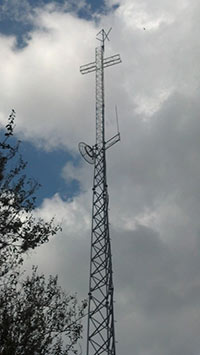
Submitted by Mike Vanhooser


There must be a good caption for this picture. What do you think?
Yes, we can see the fine print shows us this is not the FCC we all know and love. But, for a moment, might you might be tempted just a but, especially if you have just filed an application in DC and wanted it to be blessed?
Taking the Mug to New Heights
6/15/13 – The coffee mugs that we passed out a few years ago were so popular that a request was made to do some portable mugs this year. So that is what we did.
Richard Rudman decided to take the mug to new heights, on top of a 40-foot Genie lift.


A lot more MugShots are on https://www.thebdr.net/the-bdr-mug-shot-page/ See who are the coffee adicts!
Sliding Around the Rules
… Slide Rules, actually.
3/16/13 – A thread on the BROADCAST mailing list (www.radiolists.net) regarding those that still had their slide rules brought some interesting responses.

In addition to his career in radio, Gary Peterson taught in High School.
However, do not think this is the only slide rule that he has.
Gary’s Collection can be well-described as “substantial.”
Among all the paper & plastic, special purpose rules/calculators are ones that compute impedance, given reactance & resistance, decibels vs. power ratio, parallel resistors/series capacitors, trans-mission line de-rating, coil turns vs. inductance, microwave path loss, etc., etc. Many of these were sold/given away by Andrew, IRC, Cornell-Dubilier, Allied Radio, Shure, Electro-Voice, ARRL, Decibel Products, Grass Valley Group, Ohmite, Hallicrafters, Burstein-Applebee, Nurad, Loral, Telonic, Belden, California Eastern Laboratories, General Electric, International Rectifier, Sprague, Sylvania, Cutler-Hammer, Scientific Atlanta, Wavelink, Broadcast Microwave Services, Operadio, Varian, Acrodyne, Prodelin, Antenna Specialists and Sitco – there is even a Smith Chart slide rule.


The first picture we got is from Bob Groome of RF Specialties, showing off his CIE slide rule from Cleveland Institute of Electronics, the school started by Carl E Smith, the consultant and book writer.

“It has all the resonate, temperature and frequency scales on the reverse side which were very handy for DA and AM LTU work before calculators. Bought this from his school back in the early 70’s to use while I worked at WERE, 1300 Cleveland.”

The BDR gets a taste of winter weather
2/20/13 – OK, so a half an inch of snow is no big deal to you, we understand that. But when it snows in Tucson, it is pretty crazy in a place where we run around in short-sleeved shirts almost all year long. So, indulge us just a bit for feeling like we had a major storm. After all, they postponed the golf tournament a whole day because of this white stuff!

You will not see this on Google Street View!

You will not see this on Google Street View!

Virtually no one in this town knows how to drive in the snow. At the height of the storm, visibility was almost nothing. Fortunately, except in the foothills, the snow did not accumulate on the streets. Still, for a once in a decade or two, it stayed on lawns (rock gardens out here!) over night.
All right … go ahead, you guys from other parts, where you are dealing with a lot more of this stuff. So the world did not end. It just seemed like it did here during the white out!
Radiotelephone First Class
Remember the First Phone? Recently, while going through old files, Margie Wrye-Clement found her father’s first First Phone, dated 1937. This is just three years after the FCC was created!

The real oldtimers will recall that in those days, you had to your “service record” signed when you left a position. A few unscrupulous operators tried to “jam” an engineer with a bad endorsement, but most of the time, it was an interesting record of service.

Setting Up a Studio on the Fly
[September 10, 2011] The remnants of Hurricane Irene have brought flooding and other problems all up and down the East Coast. News reports have shown flooding in many cities. Of course, some radiostations just go off the air when the power dies, or the water comes. Some that stay on merely keep the automation going, to the commercials will play.
WEBO, Owego, NY took a higher approach – literally.

When the power went out, WEBO got the generator going. When their studios in downtown Owego were flooded, WEBO did not stop broadcasting – nor turn on the automation to cover the hours.




As seen above, staff and guests crowded into the camper and kept up the information flow.
It was no accident that owner Dave Radigan and his family were awarded the “Small Business of the Year Award” in January 2009. Their bottom line is the community.
By the way, the downtown studio has significant water damage. So, the station will be in the camper for a while …
A Unique Product
This product was introduced in the mid-1960s to address a particular problem. Can you remember the product name and what unique ability it had?

The answer is at the bottom of this page.
Revisiting Memphis after the Flood
June 2011
WDIA, Memphis, TN
As with all floods, eventually, the water recedes. Then starts the process of cleaning up and getting transmitters back on the air. The following information and pictures were supplied by the kind folks at WDIA as they show some of the aftermaths of the flooding – and why it is important to do a full inspection of the entire transmission system at any station before powering back up.
One of the things that might surprise you, for example, is to know that the insulators that were contacted by the water did not fare so well. For example, in this picture at tower 1, every insulator that was touched by water shattered!


ATU #1 after the flood. But take a close look at the insulators. Every one shattered from stress after contact with water.
That came from only three inches of water (see below for the picture when the water crested). And was attributed to water getting past the glazing and into the interior of the standoffs. With more water, the effects were more dramatic.
Now, here is a look into another ATU – one that was under six feet of water.




WDIA Tower 1 on 5/5/11. No, it is not shunt fed.
And … they expected almost three more feet of water after this picture, before the crest. How did it look at 47.75 feet? Oh my!

It looks like WDIA only got a couple of inches of water in the #1 ATU, probably enough to ruin the contactors but not much more. Most of the rest of the ATU’s remained above the water but the station will not be able to be sure until the waters recede to allow access – which will take 3-5 weeks.
If that were not enough, the mosquitoes are having a good time this year.
Also in Memphis – KWAM … on 5/6/11 with the river at 46 feet.


As the water made its 47.75 foot crest, water nearly took over.


Photos Courtesy: Gary Condrey, CC Memphis
Just one of the stations creamed by the Tornados
WYTH, Madison, GA


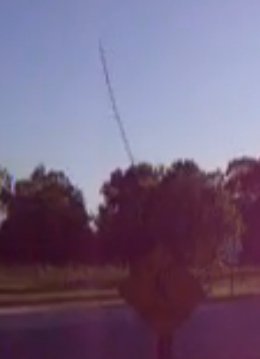 Video: This tower was brought down on Friday 4/29/11, and the station was moved to another site, about a mile away, and returned to the air the next day, 4/30/11 under STA permission from the FCC.
Video: This tower was brought down on Friday 4/29/11, and the station was moved to another site, about a mile away, and returned to the air the next day, 4/30/11 under STA permission from the FCC.
**** The mystery picture above is of a KRS STACT cart machine. The unique design of the large white tape cartridges was a mechanism to allow the operator to reverse the tape and rewind back to the beginning of a cut, rather than having to cycle the entire cart to get back to the beginning. Now … what did KRS stand for?
